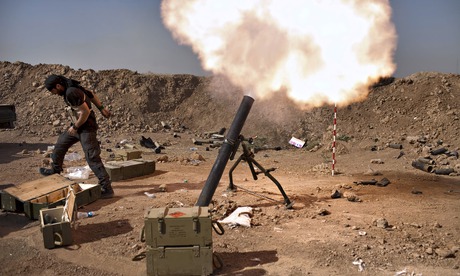
US airstrikes near a Shia Turkoman town north of Baghdad have cleared the way for militiamen and Iraqi troops to rescue 12,000 residents from jihadis who had besieged them for more than two months.
The jihadis from the extremist group Islamic State (Isis) had partially withdrawn from the outskirts of Amerli, around 110 miles north of Baghdad, when paramilitaries and Iraqi forces attacked around dawn on Sunday. The attack came hours after US jets had pushed further south into Iraq than at any time in the last three weeks when they have been attacking insurgent positions in support of the Kurds. Aid was also air dropped to Amerli by British, French and Australian aircraft.
RAF Hercules aircraft dropped 14 tonnes of food and water on Amerli on Saturday night, the defence secretary, Michael Fallon, said as he confirmed that Britain is keeping open the option of joining US air strikes against Isis forces.
The Iraqi forces were heavily backed by Kurdish peshmerga troops and Shia militiamen, who have been at the vanguard of most clashes in central Iraq ever since Isis overran more than one third of the country in mid-June.
The militias have been particularly active in areas of high Shia populations, or where Shia religious sites have come under threat. The residents of Amerli were all Shia Turkomans. They had been unable to escape from the town, which had been cut off from water and electricity supplies. The extremists had vowed to kill them if they did not convert to their puritanical version of Sunni Islam.
The successful rescue of Amerli marks perhaps the only time that Iraqi forces, even with strong support, have won a significant clash against Isis, since it took over Mosul, Tikrit, and most of western Iraq. Peshmerga forces, long considered a more competent fighting force, even without a unified command, also withered under an Isis onslaught when the group swept through the Nineveh plains toward Irbil from 8 August.
The extremists' momentum was stopped by US jets, which have now bombed more than 115 targets in northern Iraq. The air strikes allowed peshmerga and Iraq forces to win back the Mosul Dam, which had been seized by Isis, and led to the evacuation of tens of thousands of members of the Yazidi sect, who were helped off a mountain range by Kurdish militias that crossed into Iraq from Syria.
Nevertheless, Washington has continued to insist that its air support will not be open-ended. Barack Obama has previously said US strikes are only to support US officials in Irbil. The attacks on Isis near Amerli were the first time he had authorised hits outside northern Iraq.
Baghdad has been demanding similar US support to protect the capital from Isis's attempt to encroach from the western and southern city limits. However, Obama has refused to authorise air missions without an inclusive central government being formed. The new prime minister, Haider al-Abadi, has only days before a constitutional deadline expires to announce an administration, which he has spent the past three weeks trying to cobble together from competing sects and interests.
The drawn-out negotiations continue to raise questions about the viability of Iraq within its current borders. Of particular concern to Iraqi and regional leaders will be whether the country's Sunnis, who were marginalised when Saddam Hussein was ousted in 2003, and have remained estranged from the power base for most of the time since, will be re-empowered by a political process.
The Kurds of the semi-autonomous northern region also remain unsure that a new central government will represent their interests. Relations between the Sunnis and Kurds and the former prime minister Nouri al-Maliki had been toxic by the time that Isis advanced. The dramatic period since has exposed the feebleness of Iraqi institutions, including the military, and the strength that sect-based militias maintain within the country's fractured body politic.

